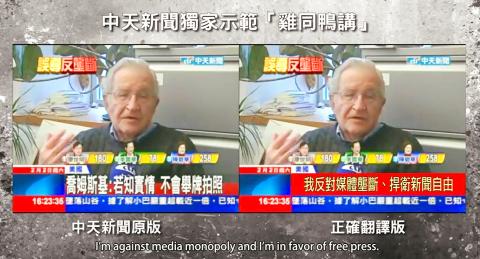CtiTV yesterday apologized for what it described as a “negligent” translation of its interview with Massachusetts Institute of Technology (MIT) professor Noam Chomsky about the ongoing controversy over the movement against media monopolization in Taiwan.
The interview, conducted last week by CtiTV Washington bureau chief John Zang (臧國華), came in the wake of a series of articles in the Chinese-language China Times — part of the Want Want China Times Group (旺旺中時集團) — alleging that Taiwanese graduate student Lin Ting-an (林庭安) had deceived Chomsky by failing to explain the slogan on a placard the professor was photographed holding that denounced “China’s black hands” interfering in local media.
Lin had contacted the 84-year-old Chomsky by e-mail to provide him with background information on the movement and fears of Chinese influence in Taiwanese media before visiting him at MIT. She made the e-mail public last week and said she had explained the situation to Chomsky before the photograph was taken.

Photo: Huang Chen-yi, Taipei Times
As reported by the Taipei Times on Saturday, Chomsky said in an official e-mail response that he did not fully understand the contents of the placard, but denied that he was misled by Lin, blaming the “misunderstanding” on his inability to read Chinese.
In his CtiTV interview with Zang, which was aired on Saturday, Chomsky said he was “misled by my lack of ability to read Chinese,” adding that he could not understand what was on the placard.
“I still don’t know what it says,” he said.
After a narration by Zang, Chomsky then said: “Sometimes it’s a conscious effort to misuse … I found out about such cases so often.”
The comments were not given any context, making it unclear if they were related to the placard, Lin’s approach or any of the sensitive political issues the professor has involved himself with over the decades.
However, Zang tied Chomsky’s remarks firmly to the controversy through a voiceover.
Soon after the interview was aired, people in the movement against media monopolization said that the captions accompanying the segment were also “misleading.”
To prove their point, they then uploaded a video on YouTube with a split screen comparing the translation made by CtiTV on the left-hand side with more accurate captioning on the right.
“Do they think we don’t understand English?” one person said in a Facebook post accompanying a link to the original interview.
In a brief statement on its Web site posted yesterday at about noon, CtiTV apologized for the poor translation of Chomsky’s remarks during the interview and attributed the errors to “negligence.”
It said the segment would be reviewed and improved.
Netizens immediately responded that the apology was inadequate, adding that they strongly doubted the errors were the result of negligent translation, but rather a deliberate attempt to mislead viewers.

Tropical Storm Gaemi strengthened into a typhoon at 2pm yesterday, and could make landfall in Yilan County tomorrow, the Central Weather Administration (CWA) said yesterday. The agency was scheduled to issue a sea warning at 11:30pm yesterday, and could issue a land warning later today. Gaemi was moving north-northwest at 4kph, carrying maximum sustained winds near its center of up to 118.8kph and gusts of 154.8kph. The circumference is forecast to reach eastern Taiwan tomorrow morning, with the center making landfall in Yilan County later that night before departing from the north coast, CWA weather forecaster Kuan Shin-ping (官欣平) said yesterday. Uncertainty remains and

SEA WARNING LIKELY: The storm, named Gaemi, could become a moderate typhoon on Wednesday or Thursday, with the Taipei City Government preparing for flooding A tropical depression east of the Philippines developed into a tropical storm named Gaemi at 2pm yesterday, and was moving toward eastern Taiwan, the Central Weather Administration (CWA) said. Gaemi could begin to affect Taiwan proper on Tuesday, lasting until Friday, and could develop into a moderate typhoon on Wednesday or Thursday, it said. A sea warning for Gaemi could be issued as early as Tuesday morning, it added. Gaemi, the third tropical storm in the Pacific Ocean this typhoon season, is projected to begin moving northwest today, and be closest to Taiwan on Wednesday or Thursday, the agency said. Today, there would likely

DISRUPTIONS: The high-speed rail is to operate as normal, while several airlines either canceled flights or announced early departures or late arrivals Schools and offices in 15 cities and counties are to be closed today due to Typhoon Gaemi, local governments announced last night. The 15 are: Taipei, New Taipei City, Taoyuan, Tainan, Keelung, Hsinchu and Kaohsiung, as well as Yilan, Hualien, Hsinchu, Miaoli, Chiayi, Pingtung, Penghu and Lienchiang counties. People should brace for torrential rainfall brought by the storm, with its center forecast to make landfall on the east coast between tonight and tomorrow morning, the Central Weather Administration (CWA) said. The agency issued a sea warning for the typhoon at 11:30pm on Monday, followed by a land warning at 11:30am yesterday. As of

CASUALTY: A 70-year-old woman was killed by a falling tree in Kaohsiung as the premier warned all government agencies to remain on high alert for the next 24 hours Schools and offices nationwide are to be closed for a second day today as Typhoon Gaemi crosses over the nation, bringing torrential rain and whipping winds. Gaemi was forecast to make landfall late last night. From Tuesday night, its outer band brought substantial rainfall and strong winds to the nation. As of 6:15pm last night, the typhoon’s center was 20km southeast of Hualien County, Central Weather Administration (CWA) data showed. It was moving at 19kph and had a radius of 250km. As of 3pm yesterday, one woman had died, while 58 people were injured, the Central Emergency Operation Center said. The 70-year-old